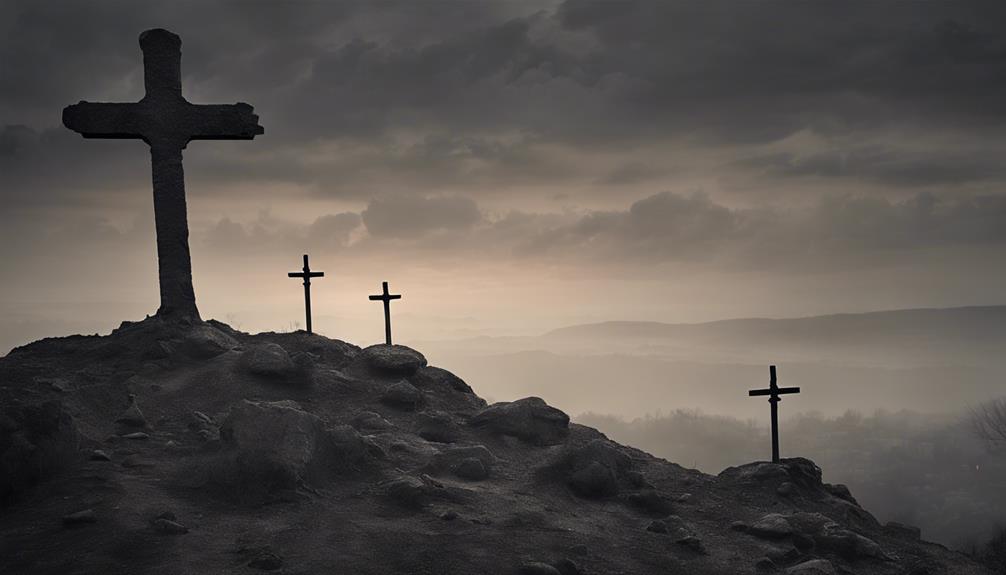Hidden within the Bible, the skull symbolizes mortality and victory over death, beckoning readers to explore its profound and eternal mysteries.

What Does a Skull Represent in the Bible
As you stand at the crossroads of history and theology, the symbol of a skull in the Bible is an anchor in the stormy seas of interpretation. From the hill of Golgotha, named for its skull-like appearance, to the depths of spiritual reflection, skulls carry a weight of meaning that's both ominous and enlightening.
They whisper tales of mortality, victory over death, and the prophetic visions that have shaped centuries of belief. Unraveling these layers might just change your perspective on life, death, and the eternal.
So, why not explore further and uncover what lies beneath the surface?
Key Takeaways
- A skull symbolizes human mortality, the consequences of sin, and the promise of eternal rest.
- Golgotha, the place of the skull, underscores death's intersection with redemption and prophecy.
- In biblical prophecy, skulls represent mortality and the hope of resurrection and divine renewal.
- Skull imagery invites introspection on spiritual condition and preparation for eternal judgment.
Symbolism of Golgotha

Golgotha, the site of Jesus Christ's crucifixion, symbolizes a profound intersection of death, redemption, and the fulfillment of prophecy within Christian theology. Often referred to as 'the place of the skull,' its etymology and geographical significance reinforce the event's historical and spiritual gravity. You're delving into a topic where the crucifixion site isn't just a backdrop for a pivotal moment in Christian narrative; it's an emblem of the culmination of ancient prophecies and a testament to the transformative power of sacrifice.
The historical significance of Golgotha extends beyond its biblical mention. It's a tangible link to the past, a place where history and faith converge. By examining this crucifixion site, you're not merely recounting an event; you're exploring the layers of meaning that have accrued over millennia. This place, steeped in both historical and theological import, offers a unique vantage point from which to understand the profound implications of Christ's death and its central role in Christian doctrine.
In analyzing Golgotha, you're unpacking a complex symbol that encapsulates themes of atonement, salvation, and divine promise. It's a reminder of the depth and breadth of Christian theology, rooted in an event that continues to resonate through history and belief.
Death and Mortality
ARTICLE TITLE: Meaning of Skull in the Bible
CURRENT SUBTOPIC: 'Death and Mortality'
Exploring the symbolism of Golgotha brings us closer to understanding the broader themes of death and mortality in biblical context. The skull, a stark reminder of human finitude, holds deep significance. It's not just a symbol of death, but a profound reminder of the consequences of mortal sin and the hope for eternal rest.
In the biblical narrative, death isn't merely the cessation of life; it's intricately linked with the moral choices we make. Mortal sin, actions that sever our relationship with the divine, steer us toward spiritual death, emphasizing the gravity of our earthly decisions.
The concept of eternal rest offers a contrasting perspective. It's a promise of peace and redemption beyond the grave for those who live in accordance with divine will. This duality underscores a fundamental biblical truth: our actions in life echo in eternity.
Concept |
Significance |
|---|---|
Mortal Sin |
Leads to spiritual death, highlighting the importance of moral integrity. |
Eternal Rest |
Promises peace beyond death, underscoring the hope of redemption and salvation. |
This analysis reveals how deeply the themes of death and mortality are woven into the fabric of biblical teaching, urging us to reflect on our lives and choices.
Victory Over Death

The concept of victory over death in the Bible symbolizes the ultimate triumph of divine intervention, offering believers a profound sense of hope and assurance in the face of human mortality. This victory isn't just a temporary reprieve but a promise of eternal life, fundamentally altering the believer's understanding of death itself. Through narratives and teachings, the Bible weaves a tapestry of resurrection hope, where death isn't an end but a transition into a life that transcends earthly boundaries.
Central to this concept is the resurrection of Jesus Christ, which serves as the cornerstone of Christian faith, embodying the victory over death and the grave. This event isn't merely a historical assertion; it's a beacon of eternal life, assuring believers that death has lost its sting. The resurrection hope isn't an abstract concept but a tangible promise of what awaits believers beyond this life.
Thus, in the biblical context, victory over death encompasses more than mere survival; it's about the anticipation of an everlasting communion with the divine. It's a testament to the power of faith, offering a lens through which believers view their mortal journey and its inevitable end, not with despair but with unwavering hope and joy.
Skulls in Biblical Prophecy
In biblical prophecy, skulls often symbolize mortality and the impermanence of human life, serving as a stark reminder of the inevitable reality all must face. This symbolism isn't just a macabre fixation but a profound element of prophetic imagery that encourages introspection about life's transient nature and the eternal beyond.
Consider Ezekiel's vision, where the valley of dry bones, including numerous skulls, serves as a powerful prophetic metaphor. This imagery isn't mere decoration; it's a vivid illustration of resurrection and hope amidst apparent desolation. Through this lens, skulls in biblical prophecy aren't just symbols of death but markers pointing towards renewal and divine intervention.
To create imagery in your mind:
- A valley filled with dry, sun-bleached skulls and bones, symbolizing national despair.
- The sudden, miraculous assembly of these bones into living beings, representing divine restoration.
- A single, isolated skull reminding onlookers of their personal mortality and the need for spiritual readiness.
- The contrast between the lifeless skulls and the promise of eternal life, illustrating the profound biblical tension between death and resurrection.
This analytical exploration into skulls within biblical prophecy reveals their role as potent symbols, urging reflection on mortality, divine judgment, and the promise of eternal life beyond the physical realm.
Spiritual Reflections

Reflecting on the symbolism of skulls within the biblical narrative prompts a deeper inquiry into one's spiritual condition and the broader existential questions of life and death. The skull, often a symbol of mortality, invites you to ponder your life choices and their implications in the face of eternal judgment. It's not just about the inevitability of death, but what lies beyond it under the gaze of the Divine presence.
Aspect |
Reflection |
Biblical Insight |
|---|---|---|
Mortality |
How does the awareness of death influence your daily choices? |
"Teach us to number our days, that we may gain a heart of wisdom." (Psalm 90:12) |
Judgment |
Are you living in a way that aligns with eternal truths? |
"It is appointed unto men once to die, but after this the judgment." (Hebrews 9:27) |
Divine Presence |
How do you cultivate a sense of the divine in your life? |
"Surely the Lord is in this place, and I was not aware of it." (Genesis 28:16) |
In this contemplation, the skull extends beyond a reminder of death to a symbol encouraging a life lived in full awareness of the divine. It's a call to action, urging you to align your earthly journey with the eternal, in the shadow of Divine presence and the certainty of eternal judgment.
Frequently Asked Questions
How Has the Interpretation of Skulls in the Bible Evolved From Ancient Times to Modern Christianity?
Your exploration into the evolution of skull interpretations from ancient metaphors to modern perceptions in Christianity is fascinating. Initially, skulls symbolized mortality and the transience of life.
Over centuries, these interpretations have deepened, reflecting themes of resurrection and hope within modern Christian thought. This shift highlights how ancient symbols adapt to contemporary spiritual insights, demonstrating a rich dialogue between past understandings and present-day beliefs in the Christian tradition.
Are There Any Cultural Differences in the Symbolism of Skulls Within Various Christian Denominations?
Indeed, you're navigating the rich tapestry of tradition, where skull rituals illuminate the diversity within Christianity. Exploring denominational perspectives exposes a kaleidoscope of beliefs and practices.
Some view skulls as symbols of mortality and repentance, others as relics to be revered. This variance underscores the profound impact of cultural heritage on religious expression.
Your inquiry peels back layers, revealing how deeply our interpretations are colored by the denominational lenses through which we view them.
What Role Do Skulls Play in Christian Art, Especially in Medieval and Renaissance Periods, Beyond Their Biblical Symbolism?
In Christian art, particularly during the medieval and Renaissance periods, skulls aren't just symbols from the Bible. They play a crucial role in reminding you of life's transience and the inevitability of death. These depictions often incorporate Vanitas themes and Memento mori, serving as a visual nudge towards contemplation on mortality and the ephemeral nature of earthly pleasures.
It's an invitation to reflect on deeper spiritual truths and values.
How Do Non-Christian Interpretations of Skull Symbolism Compare or Contrast With Those Found in the Bible?
Exploring skull metaphors globally, you'll find an ocean of contrast with Biblical interpretations. Skull symbolism, far beyond the stark Biblical imagery, dives into cultural perceptions, revealing a kaleidoscope of meanings.
From ancestral reverence in indigenous cultures to symbols of change in Eastern philosophies, skulls carry nuanced significance. Analytically, these variances underscore the rich tapestry of human belief systems, where skulls aren't just reminders of mortality but emblems of life's cyclical nature.
Can the Representation of Skulls in Biblical Contexts Be Linked to Any Specific Archaeological Findings or Historical Events?
You're exploring whether skulls in biblical contexts tie back to real archaeological discoveries or events.
It's intriguing to consider how skull excavations and symbolic artifacts might illuminate our understanding of ancient practices and beliefs.
Linking these findings with biblical narratives offers you a unique lens to view history and spirituality.
You're delving into a field where every unearthed skull could potentially rewrite parts of what we thought we knew about past civilizations and religious symbolism.
Conclusion
In essence, the skull symbolizes the profound dichotomy of human existence. At Golgotha, the site of Christ's crucifixion, it reminds us of our mortality and the inevitability of death. Yet, it also heralds victory over death, echoing the resurrection.
Through biblical prophecy and spiritual reflection, skulls serve as a memento mori, urging us to confront our ephemeral nature. This anachronistic icon, then, isn't merely a harbinger of death, but a beacon of eternal life, encapsulating the essence of the biblical narrative.



Sign up